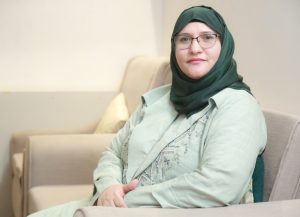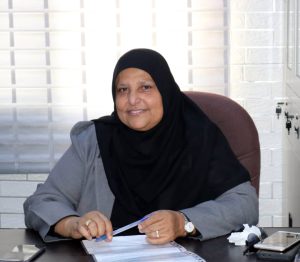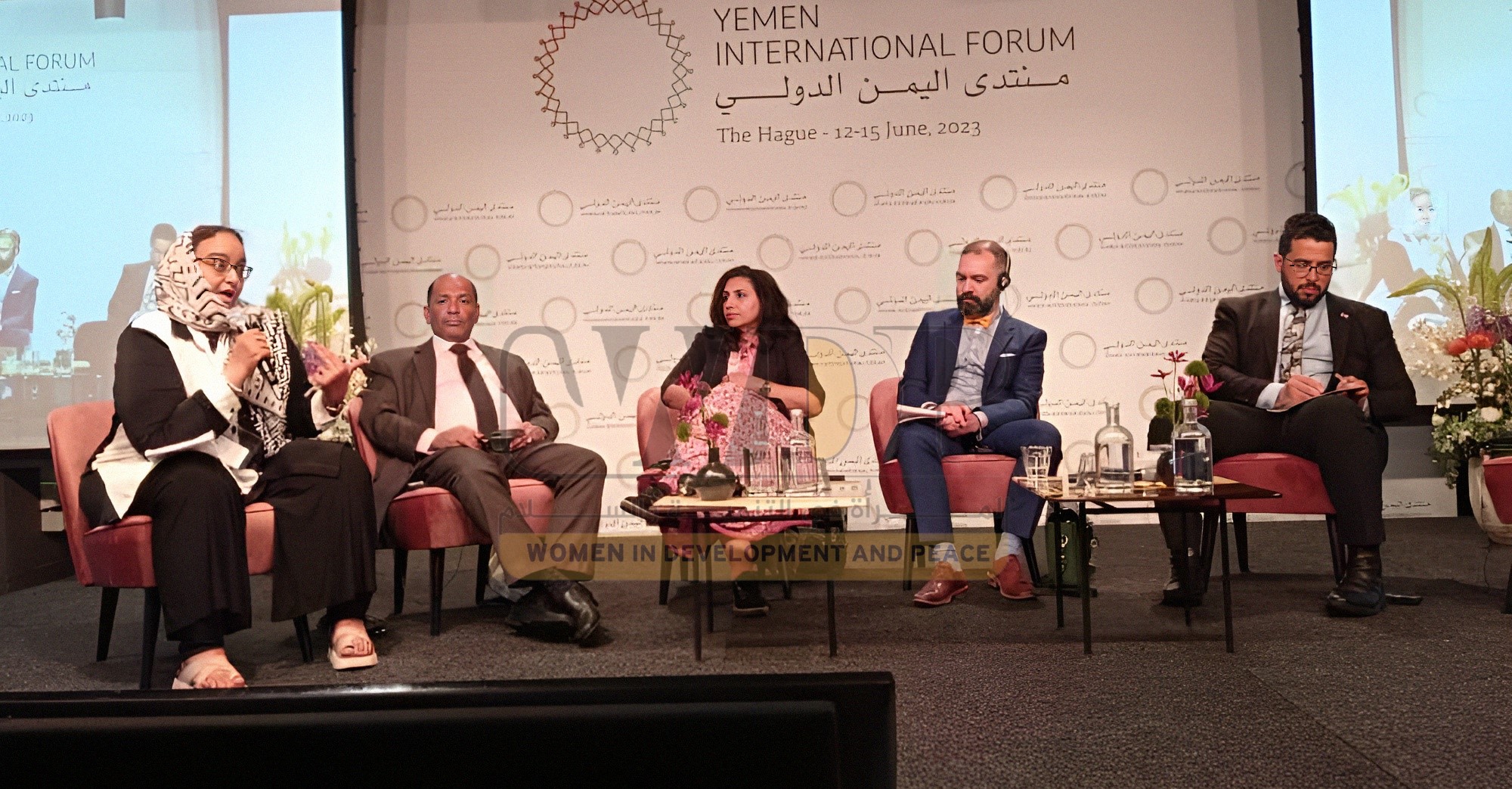Women in Development and Peace – Hanan Hussein
The Yemeni woman has consistently played significant roles across various aspects of social, economic, and political life, including the field of diplomacy. Yemeni women have had an important role in shaping political and diplomatic decisions, with many of them emerging as prominent leaders and influencers at both local and international levels.
In Yemen, women play a central role in achieving social peace and sustainable development. They do so by disseminating knowledge and raising awareness within their communities on a wide range of issues. Their efforts contribute to social, economic, security, food, and environmental stability, as well as comprehensive solutions to the challenges faced by society.
Prominent Roles
The participation of Yemeni women in diplomatic work has markedly evolved over the past few decades. In 1980, the first Yemeni woman was appointed to the diplomatic corps: Ms. Ramazia Abbas Mohammed Al-Iryani. Since then, the number of Yemeni women in various diplomatic positions has increased, both within Yemen and abroad.
 Dr. Rosa Al-Khamiri, the Director-General of Legal Affairs at Women National Committee, explains to Women in Development and Peace Newspaper, that Yemen has witnessed several political shifts that reflected the limited participation of women in political, diplomatic, and most other aspects of life. Despite evidence highlighting women’s contributions and impact on community development, social security, and safety across economic, social, cultural, political, and civil sectors, challenges persist.
Dr. Rosa Al-Khamiri, the Director-General of Legal Affairs at Women National Committee, explains to Women in Development and Peace Newspaper, that Yemen has witnessed several political shifts that reflected the limited participation of women in political, diplomatic, and most other aspects of life. Despite evidence highlighting women’s contributions and impact on community development, social security, and safety across economic, social, cultural, political, and civil sectors, challenges persist.
Al-Khamiri, pointed out that the representation of Yemeni women in the diplomatic corps falls significantly short compared to the positive discrimination stipulated in the outcomes of the National Dialogue. These outcomes aimed to empower women’s active participation in state institutions, authorities, and elected councils, with a minimum representation of 30%. Additionally, Prime Ministerial Decree No. 20 of 2014 emphasized the representation of women at a 30% rate and youth at a 20% rate in leadership positions.
Rosa further adds that the number of Yemeni women in the diplomatic corps reflects this decline and significant gap. Even if women are present, their empowerment remains minimal compared to male appointments. This situation not only perpetuates gender discrimination but also reinforces the entrenched inequalities that hinder genuine empowerment and effective strategies for women’s involvement in policy-making, law, and community development.
 Valentina Mahdi, a member of the Yemeni Women Union in Aden, highlights the limited role of Yemeni women in community development. She points out that women have minimal and insignificant involvement in social development, both in their workplaces and their country. This situation arises from societal challenges, particularly cultural norms and traditions. Even at the local level, the community’s acceptance of women in decision-making positions remains limited.
Valentina Mahdi, a member of the Yemeni Women Union in Aden, highlights the limited role of Yemeni women in community development. She points out that women have minimal and insignificant involvement in social development, both in their workplaces and their country. This situation arises from societal challenges, particularly cultural norms and traditions. Even at the local level, the community’s acceptance of women in decision-making positions remains limited.
Valentina further emphasizes “that Yemeni women face numerous difficulties. Their presence in the diplomatic corps is rarely acknowledged, especially during the current challenging phase in Yemen. Female appointments in this field are exceptionally rare, and even when they occur, women are often deprived of authority”.
Valentina Mahdi adds, “If there is genuine commitment to involving women in diplomatic work, it is essential to appoint a minimum of 30% Yemeni women in the diplomatic corps. These appointments should be based on their qualifications rather than favoritism or tokenism. Empowering them with real responsibilities is crucial because it will impact the practical reality, whether positively or negatively.”
Several experts recognize that women in Yemen’s diplomatic corps play a significant role in community development. They support women’s issues across various domains, including education, healthcare, community participation, and decision-making. These women represent their country in international forums, enhance Yemen’s image globally, and contribute to strengthening international cooperation, especially in social matters.
Challenges Hindering Women’s Role
Despite the progress witnessed in the participation of Yemeni women in diplomatic work, they still face several challenges and difficulties that hinder their advancement in the diplomatic field, as well as in other domains.
Valentina Mahdi emphasizes that there are numerous difficulties encountered by female diplomats in Yemen. One of the most significant challenges is the lack of adequate resources that enable them to work effectively, whether within Yemeni government facilities or abroad. Even when a woman is appointed in this field, she is often not granted full authority to excel in her work with the expected competence. This limitation impedes her societal contribution.
As Rosa Al-Khamiri points out, opportunities for women remain limited in the realms of political struggle (political competition) and political will. Even if competencies are not equal, women possess more competence, capability, knowledge, and service than men in most fields. However, they continue to be victims of political conflict, cultural heritage, and the absence of justice, equality, and the realization of equal opportunities politically, economically, socially, and culturally, as stipulated by the Yemeni constitution, laws, and international decisions.
Over the past years, women have faced exclusion and marginalization of their roles in various domains. They have been excluded from government formations. Here, we wonder: How will this marginalization impact women’s roles in the diplomatic field concerning community development?
Empowering Yemeni women is a central concept in the field of social development. It refers to the process that enables women to transition from a lower economic position to a higher one. This empowerment is a fundamental element for achieving sustainable development, as women’s active participation across various domains contributes to building advanced societies.
The significance of empowering women in the diplomatic field of comprehensive community development lies in their economic empowerment and the enhancement of social stability. Additionally, their involvement in decision-making and influence over policies that impact community life is crucial. Furthermore, empowering women socially helps break down barriers hindering their participation in various fields and promotes gender equality in both work and public life.
Rosa emphasizes the necessity of the female element, stating: “Women’s participation in decision-making centers, diplomatic representation, and the public sphere is a crucial topic that requires enhancement, especially during this stage where reports indicate a decline in gender equality indicators.”
She further adds: “The current representation of women in the diplomatic corps is weak. Even if it exists, it falls short of the genuine and required representation that serves community development across various issues. It does not achieve the desired aspirations, particularly for society.”
Rosa Al-Khamiri believes that there should be a comprehensive perspective that takes into account the priority of eliminating all forms of structural, functional, and political discrimination. In appointments, the required standards and transparency were not followed, resulting in unequal opportunities and a lack of political will to support women in the diplomatic field. Additionally, there is an absence of qualification for personnel in this domain, along with limited opportunities for women to present their cases to decision-makers, all while avoiding partisan favoritism.
Previously and Subsequently
 Alhan Al-Shebani, a social activist, highlights the difference between women’s roles in representing Yemen in the diplomatic corps previously and currently. In the past, when diplomatic sectors were predominantly male, women took on crucial and effective roles in diplomacy, albeit with difficulty. Their achievements and noticeable impact were often overlooked.
Alhan Al-Shebani, a social activist, highlights the difference between women’s roles in representing Yemen in the diplomatic corps previously and currently. In the past, when diplomatic sectors were predominantly male, women took on crucial and effective roles in diplomacy, albeit with difficulty. Their achievements and noticeable impact were often overlooked.
However, in the present time, there are many Yemeni female diplomats who have emerged since the onset of the conflict. Women engage in significant battles in social, political, and economic life, given their importance in Yemeni society. It is high time to recognize the ways in which women overcome barriers and celebrate their influence in the field of diplomacy.
Regarding women’s development and the efforts to address their status in the diplomatic corps, Alhan Al-Shebani points out that there are many outstanding names among successful women who have worked tirelessly to promote peace, enhance security, and advocate for women. They have also raised social awareness among women in Yemen.
Alhan adds that the Yemeni political community must prioritize granting women their right to practice diplomacy in the fields of peacebuilding and sustainable development. It is essential to empower all competent and capable women to reach a level of community awareness regarding rights, advocacy, and access to decision-making positions and the diplomatic corps.
Treatments to Improve the Status of Women
From the perspective of Dr. Rosa Al-Khamiri, the following key actions can strengthen the presence of Yemeni women in the diplomatic arena:
- Clear Implementation of Quota System: Adopt clear procedures to enforce a quota system of no less than 30% participation for women in various leadership positions, the country institutions, political parties, and organizations.
- Equality of Opportunities: The country should embrace a vision of equal opportunities across all fields and ensure that women have access to decision-making centers.
- National Plan for Women, Security, and Peace: Actively implement the National Action Plan on Women, Peace, and Security (Resolution 1325) to ensure effective participation of women in all domains.
- Challenging Stereotypes: Continue efforts to change stereotypical perceptions about women and address rigid societal attitudes, supporting their presence in decision-making roles.
- Capacity-Building Programs: Establish training and qualification programs to enhance women’s capabilities.
Many researchers believe that there are several recommendations and interventions necessary to achieve the role of women in diplomacy within community development and other fields. It is essential to create opportunities for women to work in diplomatic circles both within Yemen and abroad, contributing to a constructive vision for community building and problem-solving. Additionally, relevant authorities, in partnership with civil society organizations, should support women’s participation in political and diplomatic work by providing more opportunities in this field.
Studies emphasize the importance of combating racism and gender discrimination against women by raising awareness about women’s rights and promoting gender equality. It is crucial to enhance international cooperation in empowering Yemeni women through the exchange of experiences and joint workshops and cultural exchanges that benefit all parties in society.
Women diplomats in Yemen play a significant role in community development overall. Despite achieving numerous accomplishments in this field, they continue to face challenges. Will we witness greater support for women’s participation in diplomatic work impacting community development in Yemen in the future?

